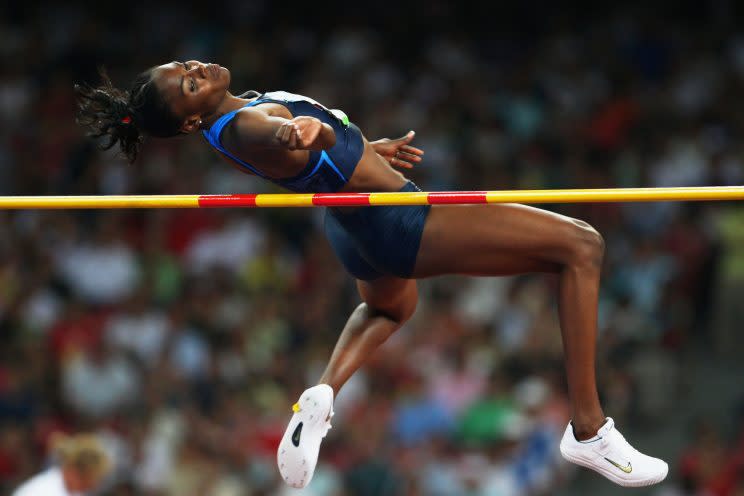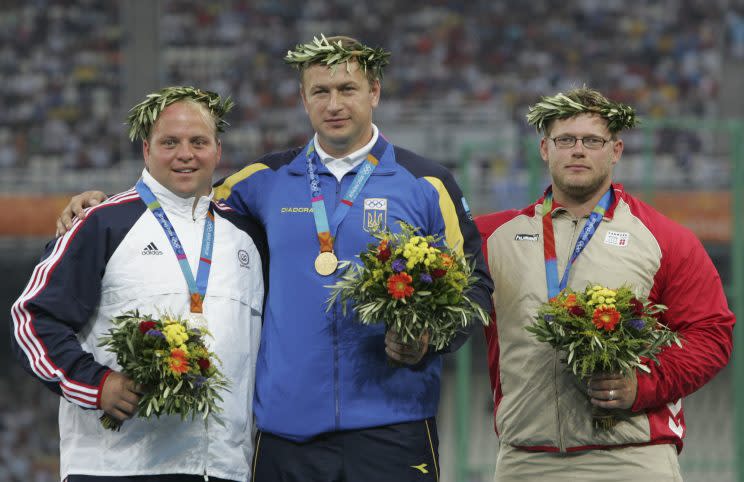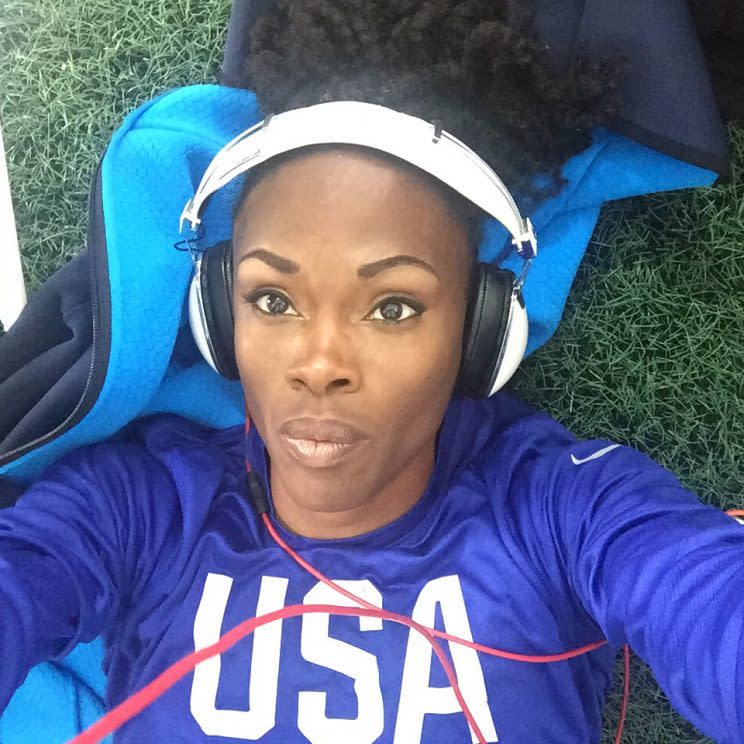Finding out you won an Olympic medal ... via Facebook eight years later

OVIEDO, Fla. – Her entire life changed with a Facebook ping.
And at first, Chaunte Lowe ignored it.
She was sitting in her home here in Central Florida late last year, with her husband taking a work test and her kids in school. Her Olympic career as a high jumper was likely over, so there was nothing to train for. Then came the ping from a fellow Olympian.
“Congratulations, Olympic bronze medalist!” wrote German high jumper Ariane Friedrich.
Silliness, she thought. Her old rivals are always joking around. She let it blink on her screen.
“Congratulations, Olympic bronze medalist!” came another message, from another competitor in a different country.
This time, she clicked.
Three Olympians in the 2008 high jump final had tested positive for banned substances. All three placed in front of Lowe. She had moved up from sixth place to fourth – no, wait! Third place.
“I was so shocked I couldn’t do the math,” says Lowe, 33, looking back on the moment. “Oh my goodness I’m third! I screamed. I jumped up and down, looking around the house. Who am I going to tell?”
The moment she had always dreamed of had arrived more than eight years after she finished off the podium in Beijing. Lowe was an Olympic medalist for the first time. Except there were no NBC cameras, no cheering fans, no flag to drape around her shoulders. There wasn’t anyone around at all.
So she sat back down and messaged some of her track friends on Facebook.
Lowe is hardly alone. A rash of doping disqualifications has plagued the Olympics movement, and it’s affected more than medal counts. There have been 76 disqualifications from the 2008 Games, and 89 from the 2012 Games. To most fans, it’s a sliver of news in the form of a passing headline. To the athletes, though, it’s life changing.
“At age 32, I didn’t see myself going to another Olympic games,” Lowe says. “I was seeing teammates with medals and accepting that was not going to be me. And all of a sudden it rewrote my Olympics story. It completely rewrote it.”
But this is not a story of all’s well that ends well. The long years between the disappointment of finishing lower than hoped and the exhilaration of justice come into a new perspective after this kind of jolt: What would those lost years have brought? What should they have brought?
“For a lot of athletes, the loss of that moment has severe repercussions financially, emotionally, and competitively,” says American shot putter Adam Nelson, whose 2004 silver turned to gold 12 years later. The nearest analogy he can come up with is “like winning a lifetime achievement award after you died.”
Lowe went to Disney for three straight days with her family after finding out, but the exclamation point led to a question mark.
“It was a roller coaster of shock, happiness, anger, sadness,” she says.
For Lowe and Nelson and others to come, that roller coaster still climbs and drops.
*****

From the age of 4, Chaunte Howard wanted to be an Olympian. She went to her mom, and her mom told her she better work hard. She went to her older sister, then 6, and got some unique advice.
“She was like, ‘If you want to run fast, eat some dirt.’ ”
So Chaunte dutifully went to a nearby parking lot, gathered up some dirt, and swallowed it.
“I ate dirt ‘til sixth grade,” she says, laughing. “I started doing it in secret because it was frowned up. I ate it ‘til the sixth grade. I was determined.”
Her mom allowed her to play in the neighborhoods of Pasa Robles, Calif., until the street lights shut off, and she did. She had a love of running and she soon found a love of jumping, setting up mattresses in the house and leaping up and down to Kris Kross’ “Daddy Mac will make you Jump, Jump!” She realized she had a talent when she jumped and her head almost hit the ceiling. “Oh my gosh,” she thought, “I’m really good at this!”
She was precocious all the way through grade school and high school. She idolized Florence Griffith Joyner and she raced with the vision of being muscular and feminine like FloJo. She won bronze in the high jump at the Pan Am Junior Championships at 19. She made the Olympic team at age 20, heading to Athens. “It was terrifying,” she says.
She kept going, following her 1.85-meter jump in the Olympics with a 2.00-meter effort that won her silver in the World Championships in 2005. She got married to a Florida State triple jumper named Mario Lowe, had a baby, bought a home, and set out for Beijing where she hoped to realize her dream. She jumped 1.99 meters (6½ feet), which was only good enough for sixth. Or so she thought.
“Maybe I’m not ready,” she thought at the time.
“I’m thinking, ‘It takes 2.05 to medal at the Olympic Games?’ ” she recalls now. “Little did I know, I had already done it.”
Missing the podium was painful to more than just her pride. “Everything was riding on those bonuses,” she says. “The opportunities that come with being a medalist. We came home and, economically, times were still hard. We lost the home we lived in, we lost the home we rented. The family we rented to – we were telling them they had to go, too. We couldn’t afford either one at that point.”
The Lowes were in the middle of the Great Recession, living in a one-bedroom apartment. Chaunte’s husband was laid off. She applied for 250 jobs, and got no interviews. Not one.
Would it have been different if she had brought home a medal? She wonders. The medal bonus would have helped, along with the money that Olympians get simply by showing up to meets as a medalist. That would have provided a cushion, if not a seed for future investment. Then there were the possible sponsorship opportunities: she was a young mother with a charismatic personality and an All-American story. Lowe went back and started calculating the lost wages. The number ran into six figures, and she became too depressed to keep tabulating. Her daughter is developmentally delayed, and the family had to move to Florida for better care. Money would have helped with that, too.
“The whole dream was coming to an end,” she says. “Man, I grew up like this. I grew up poor and not having stuff. I made all the right decisions so this wouldn’t happen, and it happened anyway.”
*****

Adam Nelson found out he was a gold medalist via a phone call from a reporter. It was a member of the press he trusted, but he had heard the doping whispers for years.
“I’ll believe it when I see it,” he politely replied.
That was 2012 – eight years after he missed the top of the podium in Athens by inches. He unleashed what was a gold-medal-winning throw in his final attempt, but he had stepped on the ring line and a red flag went up. He lived with that for four years, and then another four after injuries hindered his 2008 chances. Then he got this call, and still it amounted to nothing. A year later, in 2013, he got an email from the USOC asking him to return his silver in return for gold. He refused. “I said I would not do that until I had a gold medal in my possession,” Nelson says now.
Finally he got another email saying a USOC representative was flying through Atlanta with his gold medal. Could he meet him at the airport?
Nelson drove to the airport and met a USOC bid consultant in front of a food court Burger King. That’s how he received his gold medal.
“It was really weird,” Nelson remembers. “There wasn’t much to say. I guess I’ll just go and hop back in the car and beat traffic.”
The drive took an hour and a half.
“We kinda had an impromptu party,” Nelson says. “Then, quite honestly, it was a real struggle for me personally. I was dealing with transitioning to post-athletics. That was a hard enough transition. This brought up a lot of old wounds and reopened them. What I finally decided was I was not going to let this person take anything away from me.”
But something had already been taken. Nelson had watched another man take a victory lap unfairly. He had missed out on years of being a gold medalist. That would have been even more lucrative than Lowe’s bronze. “It’s pretty safe to say, if I won that event, I would won my share of $1 million,” he estimates. “In terms of career earnings, drugs have cost me in the $2- to 3-million range. Being a gold medalist changes the value of what I can sell myself, quite significantly.”
“For the first time, I felt sorry for myself and I was the victim here,” he says. “I had to work through that.”
How difficult was that?
“I’ve got a great wife, and a great family. I can’t say I handled it all … it’s hard.”
Nelson now has a coaching and training service for those hoping to carve out Olympic journeys. He calls it “Gold Medal Strong.” (LINK: http://goldmedalstrong.com/)
*****

Chaunte Lowe is still waiting for her medal. The USOC quickly compensated her for the prize money she was owed, and that made her very grateful, but still she wanted as much of the genuine experience as she could get. An Atlanta TV station has offered to give her a medal ceremony, and she imagines having one of her three children pass the medal to another, then to the third, then to Chaunte’s husband, who puts it on her neck. She imagines wearing the medal for a week straight, at least – to work, to the gym, to restaurants. She imagines framing it with her bib from Beijing. She can’t wait.But there’s no timetable for the arrival of the bronze. “The reallocation of medals is not automatic and is done on a case-by-case basis,” writes the IOC’s Emmanuelle Moreau in an email to Yahoo Sports. “As a general rule however, it takes place when the athletes/teams sanctioned have exhausted all their remedies of appeal and when all procedures are closed.”
Lowe has thought a lot about those high jumpers who placed in front of her and were caught for doping, including Russian Anna Chicherova, who she calls a friend. Lowe says she has no animosity – quite the opposite.
“If she doesn’t want to give up her medal, I understand why,” Lowe says. “Especially if she didn’t know [she was taking something illegal]. I would want them to know, ‘I don’t accuse you, there’s no hard feelings.’ From a human and compassion standpoint, it’s not the decision I would have made. But I understand.”
Lowe then says she hasn’t taken antibiotics since 2008, simply because she’s been too afraid to fail a test.
Nelson puts it this way: “You hold yourself to highest levels of accountability, and organizations are supposed to protect us.”
Lowe’s perspective about the past has been altered, but so has her feeling about the future. She now says she wants to compete in Tokyo in 2020.
“Why not?” she says. “My body is still saying yes.”
Her mental state is also a factor. For all these years she has wondered if she’s good enough. She entered every competition with the subtle shadow of that doubt somewhere in her mind. Now she knows. She wants to step onto the track at the Olympics knowing she is good enough. She wants the NBC cameras to find her in a way they haven’t before. She wants to be a representative for other athletes in the same awkward situation.
She cannot get those eight years back. But that lost moment of Olympic glory is still out there, and she is chasing it with the wind at her back.

 Yahoo Sport
Yahoo Sport 





































